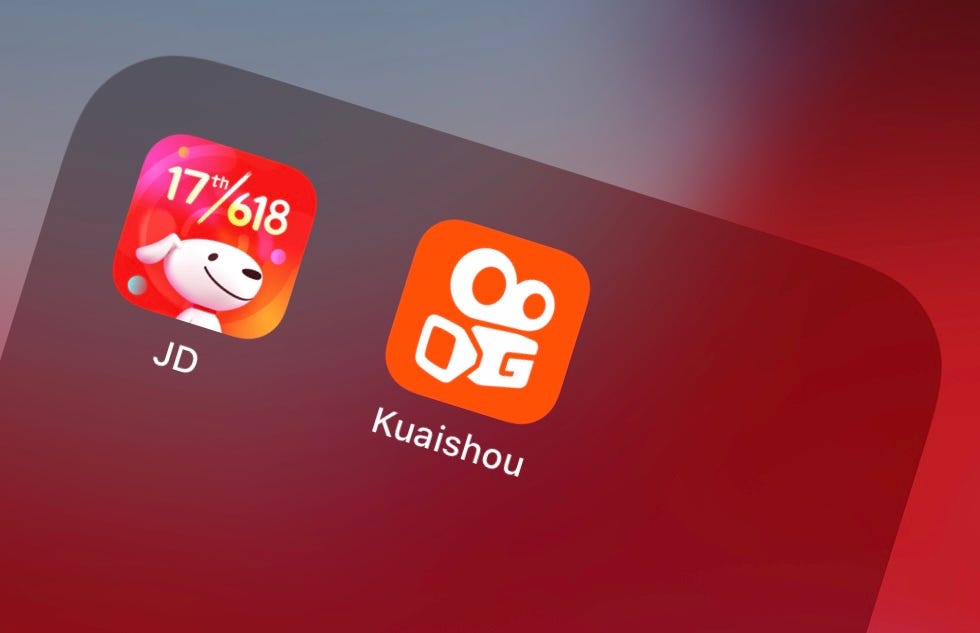Future Tech China: Why Does Kuaishou Want to Go Public?
Plus: A livestreaming crackdown, a weird and wonderful GucciFest, and luxury brands riding their ambassadors' coattails.
The Content Commerce Insider newsletter highlights how brands create content to drive revenue. If you have received our newsletter from a friend or colleague, we hope you will subscribe as well and follow us on LinkedIn and Instagram.
With a Hong Kong IPO looming, video platform Kuaishou has been valued at $50 billion, surpassing Airbnb ($30 billion), DJI ($15 billion), and Fortnite's Epic Games ($18 billion) to become one of the world's most valuable private startups.
What is Kuaishou?
Quick intro: Kuaishou (the name means “fast hand”) is best known as a short video app. A short video app with more than 300 million daily active users (DAUs) and more than 20 billion unique pieces of content. What's unique about it is that it's actually a social app.
Douyin vs. Kuaishou is Humans vs. Algorithms
Of course, this column wouldn't be a column if we didn’t give readers what they wanted. As a mind reader, I know you’re thinking — "but isn’t Douyin (aka the original Chinese version of TikTok) the undisputed short video leader?" Yes and no. A short video is a short video but a social app is not a social app.
Kuaishou originated as a photo-sharing app and pivoted to video in 2012, well before Douyin existed. Douyin appeared in 2016, and has since eclipsed Kuaishou in popularity, with a reported 600 million-plus DAUs as of mid-2020. Over the past year, both have expanded aggressively into livestreaming and e-commerce, professional productions such as film, short dramas and documentaries, music, and gaming.
Douyin is often mistaken for a social media app. It’s not. People mistake “social” to mean user-generated content. Douyin is a media app with user-generated content. It’s more akin to YouTube and Vine than Instagram and Facebook. Case in point: up to 90% of the content shown in users’ Douyin feeds comes from new accounts that are popular among other users. On Kuaishou, however, around 40% to 50% of content displayed comes from accounts that the user already follows. That's a big deal. Kuaishou is social-driven, while Douyin relies on algorithmic recommendations.
This is interesting because it highlights the differences in the operation and monetization of algorithm-driven platforms versus social-driven platforms.
Kuaishou, a social platform, sees a much higher percentage of its users creating content. A quarter of Kuaishou's 518 million monthly active users (MAUs) actually produce content.
Pay to Play
Kuaishou shows users what life is like outside of China's biggest cities. It monetized this interest through revenue generated through virtual gifts that users send to livestream performers, with Kuaishou taking a cut (though new rules aimed at limiting user spending could have a major impact).
And now it's filing for an IPO. When you search "why companies file for IPO" (I might have), Google tells you it's because companies want to raise capital.
And one can't blame them — Kuaishou has lost more than $1 billion over the past six months. China tech is pay-to-play, as seen also in the bike-sharing wars and the fact that, to this day, none of the video streaming heavyweights — iQiyi, Youku, and Tencent Video — are profitable. They pay to play and, more importantly, to grow their user base. China tends to be a winner-take-all market.
Kuaishou is backed by Tencent (20% stake) and therefore has been considered as part of the anti-Alibaba alliance. That means an otherwise unlikely content-commerce pact with JD.com that leans heavily on Kuaishou’s strength in e-commerce livestreaming (it is home to the record-breaking seller Xinba). This is strange because JD.com users tend to be wealthier and to value higher quality over getting the best value for their money. High-value is the purview of Kuaishou’s users in rural areas and third- and fourth-tier cities.
What they do have in common, though, is a largely male user base. Read this as a highlight of the extremism of China’s Alibaba versus Tencent tech proxy war, fought out through the apps they invest in. Bytedance is unique in that it has no current investment from either Alibaba or Tencent. I can’t think of many other Chinese tech platforms that have been able to not pick a side in this battle and it shows Bytedance’s power.
What the Rise of Kuaishou Means
More than anything else, Kuaishou is relevant because of its user base, which represents a force to be reckoned with. Kuaishou taps into the same (massive) user base that Pinduoduo banks on: residents of lower-tier cities and rural areas. The platform represents the rise and aspirations of the huge and upwardly mobile “submerged market.” That's why it's been successful. That's why it works.
For all the emphasis on China’s consumer upgrade among the middle classes in first-tier cities, volume ultimately matters. China's first-tier cities count about 80 million residents, while cities in the second-tier and below cities count more than 1.3 billion. Time to take a step back and look at the bigger picture.
Resources
Chinese city tier system, Wikipedia
Pay-to-play: China’s cash-burning video sector: How Kuaishou lost $1B in 6 months, TechCrunch
- by Tanya Van Gastel
Mentioned in today’s newsletter: Airbnb, Alibaba, Burberry, Bytedance, DJI, Douyin, Epic Games, Facebook, Fendi, Geoskincare, Gucci, Instagram, iQiyi, JD.com, Kuaishou, Netflix, Pinduoduo, Tencent, Vine, Youku, YouTube, Zhihu.
E-commerce Livestreaming’s “Bust” After Singles’ Day Boom
by Ginger Ooi
While e-commerce livestreaming undoubtedly helped boost this year’s Singles’ Day sales to record levels, a report on the event released by the China Consumers’ Association (CCA) revealed issues with the format, adding more urgency to calls for greater regulation of the fast-growing industry.
The CCA report called out several celebrity livestreamers for problematic practices, some of which may have involved fraud. Among those cited were TV host Wang Han, who saw a 76% return rate on certain products, leading to allegations of brushing (fake orders placed solely to boost numbers), comedian Li Xueqin, whose purported audience of 3.11 million included 3 million fake followers, and top livestreamer Li Jiaqi, who came up short on after-sales customer service with a “no exchanges” policy.
Hot on the heels of the CCA report’s release, China’s National Radio and Television Administration issued a new regulatory notice that imposes sweeping new restrictions on livestreaming, covering both entertainment and e-commerce — a sign of the growing role that integrated content commerce plays in the market, and of the corresponding need for supervision from authorities.
Entertainment livestreaming is heavily dependent on virtual gifts given by fans to performers, paid for using real money, and platforms take a cut of the proceeds. The new rules aim to control this practice by requiring both performers and users who want to give to register under their real names (and potentially with facial recognition), banning minors from giving, and imposing limits on spending. That could have a major impact on the bottom line of platforms such as Kuaishou, which earns more than half of its revenues from virtual gifting.
Livestreaming platforms must have at least one monitor on hand per 50 livestreamers to supervise the content, and must also create a system of classifying livestreams by category, with approval required for any changes.
Platforms will have to report the total number of livestream channels, hosts, and monitors to provincial radio and television authorities on a quarterly basis, and must also notify authorities in advance when they plan to invite celebrities and foreigners to host livestreams.
Fourteen-day advance notice will be required for any online shopping festivals or other promotional events that involve livestreaming, as well for live performances, reality shows, and other content used to drive e-commerce sales.
Platforms are charged with monitoring to prevent fraudulent practices and creating rating systems for livestream hosts, and must take measures such as demoting poorly rated content, or in cases of serious violations, blacklisting the parties involved.
The regulations specifically target “showing off wealth” and “money worship” as types of content that should be prohibited, which means that luxury brands in particular will have to take greater care with their messaging on livestream platforms.
Brand Film Pick: GucciFest Online Film Festival’s Message of Inclusivity
From November 16 to 22, Italian luxury house Gucci hosted an online film festival streaming on YouTube, Weibo, and GucciFest.com that exemplified the brand’s boundary-pushing content-commerce strategy. To promote its Spring/Summer 2021 collection, Gucci Creative Director Alessandro Michele collaborated with filmmaker Gus Van Sant to create a seven-part series, “Ouverture of Something That Never Ended,” featuring members of the global Gucci gang, including Harry Styles, Billie Eilish, and Florence Welch, and filled with references to the brand’s history and Michele’s work as a designer.
Italian actress, writer, and performer Silvia Calderoni is the non-binary protagonist of the series, which follows her rather Fellini-esque daily life in Rome, both at home and on excursions to the cafe, a post office, and a vintage shop chock full of Gucci.
The series presents an international vision of uber-chic ethnic and sexual diversity that is sometimes intriguing, although the dialogue often falls short, veering into nonsense. Chinese stardom is represented in the final episode by a pink-haired Lu Han as the mysterious object of Silvia’s obsession, but their interaction is limited to a brief and largely one-sided romantic conversation over an apartment intercom.
In another inclusive, and perhaps more significant move, GucciFest also included a selection of shorter, Gucci-funded films highlighting the work of 15 emerging designers from around the world, including Rui Zhou and Yueqi Qi from China, an initiative that has raised the prospect of the brand becoming a potential “Netflix of fashion.”
Jing Culture & Commerce has released the first extensive report to focus on livestreaming in the context of cultural institutions. Covid-19 has radically impacted how cultural institutions around the world engage audiences and livestreaming is emerging as an increasingly vital tool. The report presents four key case studies from 2020 (British Museum, Palace of Versailles, UCCA Beijing, and the National Museum of China) that showcase the dynamic application of live video.
In addition, the report draws from industry insights to offer tips and actionable steps for organizations considering integrating livestreaming within existing strategies.
News From China
Actress Zhao Wei’s directorial debut for the small screen, “Hear Her” (听见她说), has sparked a great deal of social media buzz as “China’s first female monologue-centered TV show.” Airing on Tencent Video, the eight-part series features some of the country’s leading actresses tackling women’s issues such as body image and single motherhood in a dramatized form.
The series also offers a prime example of how premium brands can follow the celebrities that represent them into TV and video content. The title sponsor of “Hear Her” is New Zealand beauty brand Geoskincare, which signed Zhao as a spokesperson in May, and Italian luxury house Fendi, which announced Zhao as China spokesperson in July, receives a special thanks in the credits and promotional materials for the show.
The LVMH-owned brand received prominent placement in the first episode, which is partly set in the expansive walk-in closet of the protagonist. Earlier this year, we saw Burberry as the first international luxury brand to sponsor a Chinese reality show through its participation in the third season of Youku’s “Street Dance of China” (这!就是街舞).
Q&A platform Zhihu is often described as the “Quora of China” but in reality, like many Chinese global tech firm counterparts, it is so much more.
For one thing, it offers brands more opportunities to market via advertising and self-operated accounts. And like many other Chinese platforms, it is investing heavily into developing content and IP.
Zhihu’s latest initiative is a monthly series called “New Knowledge Youth Talks” (新知青年说) that will feature leading Zhihu contributors participating in offline discussions that will be broadcast online via livestreaming and on Tencent Video.
News in English
Bytedance won another extension from the U.S. government on an order to divest its U.S. operations, giving it until December 4 to conclude a proposed deal with Walmart and Oracle to take over its business in the country. Reuters
Back home in China, Bytedance is attempting to take on Tencent and Netease with its push into gaming, shifting its focus to casual games after a previous effort with more complex games fizzled. SCMP
“V-commerce,” or video commerce, will emerge as a leading channel for sales conversions in 2021, and other predictions for influencer marketing in China in the year ahead. Parklu
Alibaba is investing nearly $1 billion to become the second-largest shareholder in Mango Excellent Media, the Shenzhen-listed video streamer behind hits such as “Sisters Who Make Waves.” Yicai Global
The decentralized nature of WeChat mini-programs gives brands an opportunity to enjoy greater control over their relationships with consumers compared to traditional e-commerce platforms. Campaign Asia
Chengdu and Hangzhou are among the top emerging Chinese cities for fashion brands, according to a new ranking of up-and-coming locales. Vogue Business
“A playground where western brands have no inherent advantage:” The co-founder of brand consultancy Sedgwick Richardson discusses the current challenges faced by foreign firms in China. Branding in Asia
Cross-border selling via China’s major e-commerce platforms is proving to be a critical strategy for international brands looking to enter the market. Azoya
Chinese banks have emerged as an unlikely source of creativity on the brand film front, tapping into culture and heritage to produce works that can resonate with consumers. SHPPLUS
KFC has rolled out self-driving mini food trucks in Chinese cities in partnership with autonomous logistics startup Neolix, offering contactless fast-food service. Cnet
A U.S. company that runs TikTok houses went public via a reverse merger with a former Chinese healthcare firm. New York Times
We’ve Got China Covered
China Film Insider: “Jiang Ziya” and the Unbearable Lightness of Bourgeois Humanism
Jing Daily: How Gen Z and Millennial Needs Have Radically Changed Post-Covid-19
Jing Culture & Commerce: Spurred by Covid Lockdowns, Museums Bring Virtual Content Into Broader Play









